As part of Algonquin College’s commitment to expanding the traditional Anishinàbe (ah-nish-in-AHH-bay) Algonquin Nation language on campus, we are sharing vocabulary, phrases and information to familiarize learners and employees with the traditional language. Continue reading
campus, we are sharing vocabulary, phrases and information to familiarize learners and employees with the traditional language. Continue reading
TRI News
As part of Algonquin College’s commitment to expanding the traditional Anishinàbe (ah-nish-in-AHH-bay) Algonquin Nation language on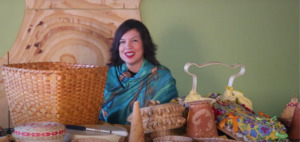 campus, we are sharing vocabulary, phrases and information to familiarize learners and employees with the traditional language.
campus, we are sharing vocabulary, phrases and information to familiarize learners and employees with the traditional language.
Nawapon (NAW-wah-PUN) is an Algonquin word that translates to “gathering strength for the journey.” Nawapon is located next to the Ishkodewan courtyard at the Ottawa Campus and is often used as a gathering place. Continue reading
As part of Algonquin College’s commitment to expanding the traditional Anishinàbe (ah-nish-in-AHH-bay) Algonquin Nation language on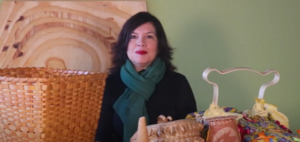 campus, we are sharing vocabulary, phrases and information to familiarize learners and employees with the traditional language. Continue reading
campus, we are sharing vocabulary, phrases and information to familiarize learners and employees with the traditional language. Continue reading
In 2015, the Truth and Reconciliation Commission of Canada (TRC) presented their report and recommendations to all Canadians. The final report included 10 Principles for Reconciliation and 94 Calls to Action that speak to all sectors of Canadian society. Certain Calls to Action were related specifically to education.
report included 10 Principles for Reconciliation and 94 Calls to Action that speak to all sectors of Canadian society. Certain Calls to Action were related specifically to education.
In the 10 years since the report was made public, Algonquin College has carried out solid work to move towards implementing the Calls to Action and acknowledges that much more is still to be done. Continue reading
As part of Algonquin College’s commitment to expanding the traditional Anishinàbe (ah-nish-in-AHH-bay) Algonquin Nation language on campus, we are sharing vocabulary, phrases and information to familiarize learners and employees with the traditional language. Continue reading
campus, we are sharing vocabulary, phrases and information to familiarize learners and employees with the traditional language. Continue reading
The Mamidosewin Centre was spreading love and information on Valentine’s Day as it brought attention to the rights of First Nations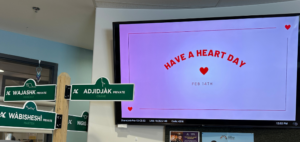 children in Canada, particularly on access to proper health care, education and safe homes.
children in Canada, particularly on access to proper health care, education and safe homes.
Have a Heart Day is marked on Feb. 14 each year to coincide with Valentine’s Day, encouraging people to “have a heart” for the wellbeing of Indigenous youth. Continue reading
Welcome to the third edition of “Kwey,” Algonquin College’s Indigenous Language Video Series. “Kwey” is an Algonquin greeting that means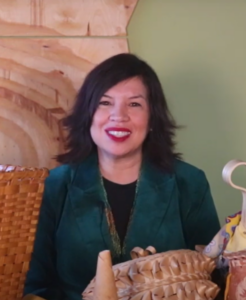 hello.
hello.
In the spring of 2024, we introduced you to a selection of videos sharing words, expressions and phrases in the Anishinàbe Algonquin language, the traditional language of this region. The fall edition focused on greetings, common phrases and the Seven Grandfather teachings. Continue reading
Niganizi: The One Who Leads, an Indigenous student leadership program took place on-the-land from Feb. 1-2, 2025, in Gracefield, Que. The two-day retreat included various cultural activities, workshops and teachings from Elders. The program’s goal is to provide training and support to Indigenous students and empower them to become stronger leaders in their personal and professional lives. Indigenous students from all different backgrounds, heritage groups and programs were invited to attend. Continue reading
The two-day retreat included various cultural activities, workshops and teachings from Elders. The program’s goal is to provide training and support to Indigenous students and empower them to become stronger leaders in their personal and professional lives. Indigenous students from all different backgrounds, heritage groups and programs were invited to attend. Continue reading
On Tuesday, Jan. 28, 2025, over 40 employers from across the National Capital Region met with hundreds of students as Algonquin College hosted Indigenous students from Carleton University, Collège La Cité and the University of Ottawa at the Ottawa Indigenous Student Career Fair in Nawapon. Continue reading
hosted Indigenous students from Carleton University, Collège La Cité and the University of Ottawa at the Ottawa Indigenous Student Career Fair in Nawapon. Continue reading
On Tuesday, Jan. 7, new and returning students visiting the Mamidosewin Centre enjoyed a drumming session, yummy tacos, soup and bannock at a Welcome Feast to start the semester.
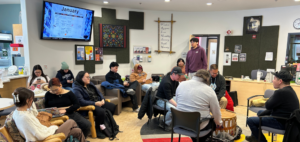 Attendees were also able to meet with and speak to employees to learn about the many services and resources available to students.
Attendees were also able to meet with and speak to employees to learn about the many services and resources available to students.
To learn more about upcoming events, please visit the Mamidosewin Centre Facebook page.